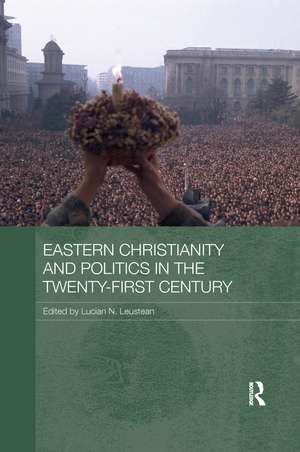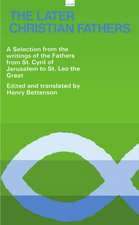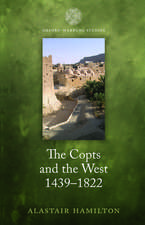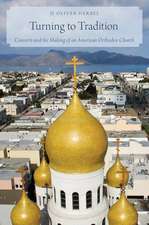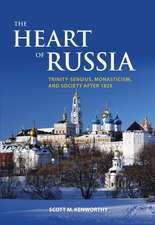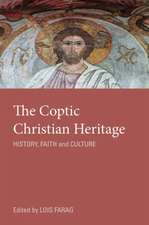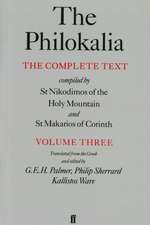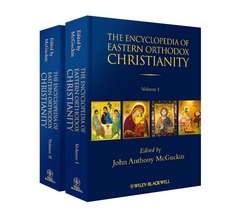Eastern Christianity and Politics in the Twenty-First Century: Routledge Contemporary Russia and Eastern Europe Series
Editat de Lucian N. Leusteanen Limba Engleză Paperback – 10 mai 2017
| Toate formatele și edițiile | Preț | Express |
|---|---|---|
| Paperback (1) | 402.44 lei 6-8 săpt. | |
| Taylor & Francis – 10 mai 2017 | 402.44 lei 6-8 săpt. | |
| Hardback (1) | 1958.23 lei 6-8 săpt. | |
| Taylor & Francis – 5 iun 2014 | 1958.23 lei 6-8 săpt. |
Din seria Routledge Contemporary Russia and Eastern Europe Series
-
 Preț: 309.79 lei
Preț: 309.79 lei -
 Preț: 326.49 lei
Preț: 326.49 lei -
 Preț: 326.15 lei
Preț: 326.15 lei - 9%
 Preț: 1010.71 lei
Preț: 1010.71 lei -
 Preț: 321.03 lei
Preț: 321.03 lei -
 Preț: 302.33 lei
Preț: 302.33 lei -
 Preț: 325.21 lei
Preț: 325.21 lei - 9%
 Preț: 934.70 lei
Preț: 934.70 lei -
 Preț: 318.10 lei
Preț: 318.10 lei -
 Preț: 379.30 lei
Preț: 379.30 lei - 18%
 Preț: 1111.51 lei
Preț: 1111.51 lei - 18%
 Preț: 1058.79 lei
Preț: 1058.79 lei - 25%
 Preț: 824.70 lei
Preț: 824.70 lei -
 Preț: 464.54 lei
Preț: 464.54 lei - 18%
 Preț: 950.71 lei
Preț: 950.71 lei - 18%
 Preț: 1168.76 lei
Preț: 1168.76 lei - 24%
 Preț: 130.54 lei
Preț: 130.54 lei - 26%
 Preț: 821.46 lei
Preț: 821.46 lei - 18%
 Preț: 1169.78 lei
Preț: 1169.78 lei -
 Preț: 413.98 lei
Preț: 413.98 lei -
 Preț: 387.49 lei
Preț: 387.49 lei -
 Preț: 406.52 lei
Preț: 406.52 lei - 18%
 Preț: 1059.93 lei
Preț: 1059.93 lei - 18%
 Preț: 1218.26 lei
Preț: 1218.26 lei -
 Preț: 418.13 lei
Preț: 418.13 lei - 18%
 Preț: 1171.89 lei
Preț: 1171.89 lei - 18%
 Preț: 1057.57 lei
Preț: 1057.57 lei -
 Preț: 413.37 lei
Preț: 413.37 lei - 18%
 Preț: 707.96 lei
Preț: 707.96 lei - 18%
 Preț: 1058.65 lei
Preț: 1058.65 lei - 18%
 Preț: 948.84 lei
Preț: 948.84 lei - 18%
 Preț: 706.91 lei
Preț: 706.91 lei - 18%
 Preț: 1059.84 lei
Preț: 1059.84 lei -
 Preț: 488.33 lei
Preț: 488.33 lei - 18%
 Preț: 1056.28 lei
Preț: 1056.28 lei -
 Preț: 390.12 lei
Preț: 390.12 lei - 18%
 Preț: 1053.16 lei
Preț: 1053.16 lei - 18%
 Preț: 1056.28 lei
Preț: 1056.28 lei - 28%
 Preț: 850.91 lei
Preț: 850.91 lei - 18%
 Preț: 1050.78 lei
Preț: 1050.78 lei - 18%
 Preț: 1166.68 lei
Preț: 1166.68 lei - 18%
 Preț: 1058.79 lei
Preț: 1058.79 lei - 18%
 Preț: 1958.23 lei
Preț: 1958.23 lei - 18%
 Preț: 1221.74 lei
Preț: 1221.74 lei
Preț: 402.44 lei
Nou
Puncte Express: 604
Preț estimativ în valută:
77.02€ • 80.11$ • 63.58£
77.02€ • 80.11$ • 63.58£
Carte tipărită la comandă
Livrare economică 15-29 aprilie
Preluare comenzi: 021 569.72.76
Specificații
ISBN-13: 9781138079465
ISBN-10: 1138079464
Pagini: 857
Ilustrații: 4
Dimensiuni: 156 x 234 x 56 mm
Greutate: 1.22 kg
Ediția:1
Editura: Taylor & Francis
Colecția Routledge
Seria Routledge Contemporary Russia and Eastern Europe Series
Locul publicării:Oxford, United Kingdom
ISBN-10: 1138079464
Pagini: 857
Ilustrații: 4
Dimensiuni: 156 x 234 x 56 mm
Greutate: 1.22 kg
Ediția:1
Editura: Taylor & Francis
Colecția Routledge
Seria Routledge Contemporary Russia and Eastern Europe Series
Locul publicării:Oxford, United Kingdom
Public țintă
PostgraduateCuprins
1. Eastern Christianity and Politics in the Twenty-First Century. An Overview Part I: Chalcedonian Churches 2. The Ecumenical Patriarchate 3. The Russian Orthodox Church 4. The Serbian Orthodox Church5. The Romanian Orthodox Church 6. The Bulgarian Orthodox Church 7. The Georgian Orthodox Church 8. The Orthodox Church of Cyprus 9. The Orthodox Church of Greece 10. The Polish Orthodox Church 11. The Orthodox Church of Albania 12. The Orthodox Church in the Czech Lands and Slovakia 13. Orthodox Churches in America 14. The Finnish Orthodox Church 15. Orthodox Churches in Estonia 16. Orthodox Churches in Ukraine 17. The Belarusian Orthodox Church 18. The Lithuanian Orthodox Church 19. The Latvian Orthodox Church 20. Orthodox Churches in Abkhazia, South Ossetia and Transnistria 21. Orthodox Churches in Moldova 22. The Macedonian Orthodox Church 23. Orthodox Churches in Japan, China and Korea 24. Orthodox Churches in Australia Part II: Non-Chalcedonian Churches 25. The Armenian Apostolic Church 26. The Ethiopian Orthodox Tewahedo Church and the Eritrean Tewahedo Orthodox Church 27. The Coptic Orthodox Church, Fiona McCallum 28. The Syrian Orthodox Church 29. Syrian Christian Churches in India Part III: The Holy Apostolic Catholic Assyrian Church of the East 30. The Holy Apostolic Catholic Assyrian Church of the East Part IV: Greek Catholic Churches in Eastern Europe 31. The Ukrainian Greek Catholic Church 32. The Romanian Greek Catholic Church 33. The Bulgarian Eastern Catholic Church 34. The Hungarian Greek Catholic Church Part V: Challenges in the Twenty-First Century 35. Orthodox Churches and Migration 36. The Greek Catholic Churches in Post-War Catholic–Orthodox Relations 37. Secularism without Liberalism: Orthodox Churches, Human Rights and American Foreign Policy in Southeastern Europe 38. Orthodox Christianity and Globalisation
Notă biografică
Lucian N. Leustean is a Senior Lecturer in Politics and International Relations at Aston University, Birmingham, UK.
Recenzii
‘This timely collection of essays provides a thorough and nuanced understanding of the multifaceted role of Eastern Christianity and politics that takes us beyond the caricatures of the so-called "clash of civilizations." In this globalized post-secular age of the resurgence of religion, this book reveals how the form of the relation between Eastern Christianity and politics is specific to the particular part of the world in which Eastern Christianity finds itself--Eastern Europe, Middle East, Asia, North Africa or the the diaspora communities of North America, Western Europe and Australia. Given the utter ignorance of the complexities of Eastern Christianity that pervades western academic discourse, this book is a must read for scholars and students of international relations, politics and the study of religion, as well as government officials interested in a well-informed and serious engagement with politics in light of - not in spite of - religion.’ – Aristotle Papanikolaou, Archbishop Demetrios Chair in Orthodox Theology and Culture, Fordham University, USA
‘This excellent collection brings together some of the best researchers in the field, who skilfully tackle the problem of applying traditional understandings of religion and politics or secularisation theory to the world of Eastern Christianity. They offer new insights into the ways in which churches have coped with the particular challenges they face in responding to political reconstruction, nation-building, political conflict, religious pluralism and the consequences of globalisation.’ – John Anderson, Professor of International Relations, University of St Andrews, UK
‘An impressive panorama of encyclopedic scope on the problems and prospects of the Eastern Churches. The several chapters provide convincing evidence on the renewal of religious life and on the strivings of the Orthodox and other Eastern Churches to come to grips with the challenges of the twenty first century.’ – Paschalis Kitromilides, Professor of Political Science, University of Athens, Greece
‘One of the difficulties of understanding the politics of the peoples of Eastern Europe and their various diasporas, for example in Serbia and Ukraine, is due to the culpable ignorance of western journalists of the role of religion in Orthodox cultures. This book provides a comprehensive and authoritative coverage which could do much to increase our understanding.’ – David Martin, Professor Emeritus of Sociology, London School of Economics and Political Science and Fellow of the British Academy, UK
‘Lucian Leustean has established himself as the pre-eminent scholar of the Orthodox and other Eastern Churches. This fascinating collection of essays, all written by authoritative researchers, discusses the myriad of issues facing the Orthodox world on every continent. Among the key issues of 21st century state relations to be discussed are the tension between the Russian Orthodox and Ukrainian Greek Catholic communities in Ukraine, the role of the Georgian Church in asserting that people's nationhood, and that of the nearby Orthodox Church in Abkhazia; and, in the cauldron of the Middle East, the politics of the Coptic Church in Egypt and the various churches of Syria. For students of the coloured revolutions and the Arab Spring, this book is a must.’ – Geoffrey Swain, Alec Nove Chair in Russian and East European Studies, University of Glasgow, UK
"This massive and very impressive volume presents an unusually broad and contemporary picture of Eastern and Oriental churches, now spread globally, with a primary focus on politics, or the relationship between Orthodoxy and state formations."
Reviewed by Walter Sawatsky, Professor Emeritus of Church History & Mission, Anabaptist Mennonite Biblical Seminary, Elkhart IN.
"There is no single volume that encapsulates so much material on the often little-known or understood world of Orthodoxy. Mandatory for reference collections."
--G. P. Cox, Gordon State College
Summing Up: Essential. Lower-level undergraduates and above; general readers.CHOICE
‘This excellent collection brings together some of the best researchers in the field, who skilfully tackle the problem of applying traditional understandings of religion and politics or secularisation theory to the world of Eastern Christianity. They offer new insights into the ways in which churches have coped with the particular challenges they face in responding to political reconstruction, nation-building, political conflict, religious pluralism and the consequences of globalisation.’ – John Anderson, Professor of International Relations, University of St Andrews, UK
‘An impressive panorama of encyclopedic scope on the problems and prospects of the Eastern Churches. The several chapters provide convincing evidence on the renewal of religious life and on the strivings of the Orthodox and other Eastern Churches to come to grips with the challenges of the twenty first century.’ – Paschalis Kitromilides, Professor of Political Science, University of Athens, Greece
‘One of the difficulties of understanding the politics of the peoples of Eastern Europe and their various diasporas, for example in Serbia and Ukraine, is due to the culpable ignorance of western journalists of the role of religion in Orthodox cultures. This book provides a comprehensive and authoritative coverage which could do much to increase our understanding.’ – David Martin, Professor Emeritus of Sociology, London School of Economics and Political Science and Fellow of the British Academy, UK
‘Lucian Leustean has established himself as the pre-eminent scholar of the Orthodox and other Eastern Churches. This fascinating collection of essays, all written by authoritative researchers, discusses the myriad of issues facing the Orthodox world on every continent. Among the key issues of 21st century state relations to be discussed are the tension between the Russian Orthodox and Ukrainian Greek Catholic communities in Ukraine, the role of the Georgian Church in asserting that people's nationhood, and that of the nearby Orthodox Church in Abkhazia; and, in the cauldron of the Middle East, the politics of the Coptic Church in Egypt and the various churches of Syria. For students of the coloured revolutions and the Arab Spring, this book is a must.’ – Geoffrey Swain, Alec Nove Chair in Russian and East European Studies, University of Glasgow, UK
"This massive and very impressive volume presents an unusually broad and contemporary picture of Eastern and Oriental churches, now spread globally, with a primary focus on politics, or the relationship between Orthodoxy and state formations."
Reviewed by Walter Sawatsky, Professor Emeritus of Church History & Mission, Anabaptist Mennonite Biblical Seminary, Elkhart IN.
"There is no single volume that encapsulates so much material on the often little-known or understood world of Orthodoxy. Mandatory for reference collections."
--G. P. Cox, Gordon State College
Summing Up: Essential. Lower-level undergraduates and above; general readers.CHOICE
Descriere
This book provides an up-to-date, comprehensive overview of Eastern Christian churches in Europe, the Middle East, Africa, Asia, Australia and the US. Written by leading international scholars in the field, it examines both Eastern Orthodox and Oriental churches from the end of the Cold War until the present day. The book examines the religious revival after the fall of communism, changing relations between churches and the political realm, and then goes on to analyse the new challenges faced by Eastern Christian churches in the twenty-first century.
